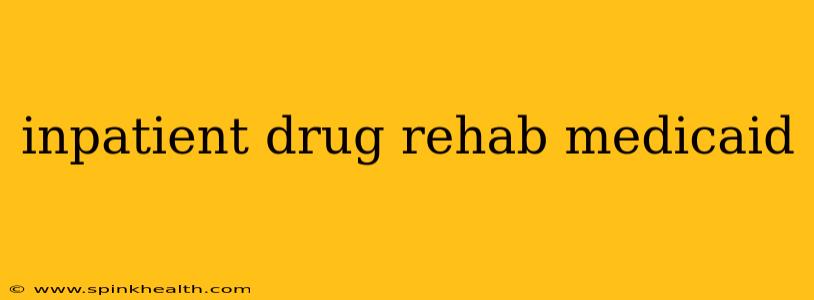The journey to recovery from drug addiction is a challenging but achievable one. For many, the financial burden of treatment can seem insurmountable, creating a significant barrier to accessing the life-saving help they need. This is where Medicaid can play a crucial role. Medicaid, a joint state and federal program, provides healthcare coverage to millions of low-income Americans, and its coverage can extend to vital inpatient drug rehabilitation services. However, navigating the complexities of Medicaid and securing inpatient rehab can be confusing. Let's unravel the process together.
What is Inpatient Drug Rehab?
Inpatient drug rehab, also known as residential treatment, involves a comprehensive program where individuals live at a facility for an extended period, typically several weeks or months. This immersive approach provides 24/7 support and supervision, allowing for intensive therapy, medical monitoring, and a structured environment conducive to recovery. Unlike outpatient programs, inpatient treatment removes individuals from their usual surroundings and triggers, minimizing the risk of relapse.
Does Medicaid Cover Inpatient Drug Rehab?
The short answer is: Yes, but it depends. Medicaid coverage for inpatient drug rehab varies significantly from state to state. While the federal government mandates that Medicaid covers substance use disorder treatment, the specifics of what's covered and the extent of coverage differ considerably. Some states may have broader coverage than others, including a wider range of facilities and treatment durations. Others might have stricter requirements, focusing on specific types of addiction or limiting the length of stay.
How to Find Inpatient Drug Rehab Covered by Medicaid?
Finding the right inpatient rehab facility covered by your Medicaid plan requires careful research and planning.
1. Contact Your State Medicaid Agency:
Your first step is to contact your state's Medicaid agency directly. They can provide you with crucial information about your specific coverage, including:
- Approved providers: A list of inpatient rehab facilities in your area that accept Medicaid.
- Coverage limits: The maximum length of stay, types of treatment covered, and any pre-authorization requirements.
- Eligibility requirements: Ensuring you meet all the necessary criteria for Medicaid coverage.
2. Utilize Online Resources:
Several online resources can assist your search:
- The Substance Abuse and Mental Health Services Administration (SAMHSA): SAMHSA's National Helpline (1-800-662-HELP) can provide referrals to treatment facilities in your area and information on Medicaid coverage.
- Your state's behavioral health authority: Many states have dedicated agencies responsible for overseeing mental health and substance abuse services. They can offer guidance on Medicaid-covered rehab options.
3. Check with Local Hospitals and Treatment Centers:
Directly contacting local hospitals and rehab centers can help you determine if they accept your specific Medicaid plan.
What are the Different Levels of Care Covered by Medicaid?
Medicaid may cover several levels of care, including:
- Medical Detoxification: This initial phase addresses the physical withdrawal symptoms associated with substance abuse.
- Inpatient Rehabilitation: As mentioned previously, this intensive residential treatment offers 24/7 care.
- Outpatient Treatment: This less intensive option involves regular sessions with therapists and counselors, typically less demanding than inpatient care.
What If My State Doesn't Cover Inpatient Rehab?
If your state's Medicaid program doesn't fully cover inpatient rehab, there are options to explore:
- Appealing the decision: You have the right to appeal your Medicaid agency's decision if you believe your claim should be approved.
- Exploring other funding options: Consider looking into other financial assistance programs or private insurance to supplement the cost of treatment.
- Seeking help from advocacy groups: Organizations dedicated to substance abuse recovery can often provide support and guidance in navigating Medicaid or accessing other funding opportunities.
Finding the Right Fit: Beyond Medicaid Coverage
Securing Medicaid coverage is just one piece of the puzzle. Choosing the right rehab facility is equally important. Consider factors like:
- Types of addiction treated: Make sure the facility specializes in the specific type of addiction you're facing.
- Treatment modalities: Different facilities offer different approaches, such as cognitive behavioral therapy (CBT), medication-assisted treatment (MAT), and group therapy. Find a program that best suits your needs.
- Accreditation: Look for facilities accredited by reputable organizations, signifying quality care.
The road to recovery is individual, and finding the right inpatient drug rehab, covered by Medicaid or otherwise, is a crucial step. Remember, seeking help is a sign of strength, and with careful planning and perseverance, access to effective treatment is achievable.

